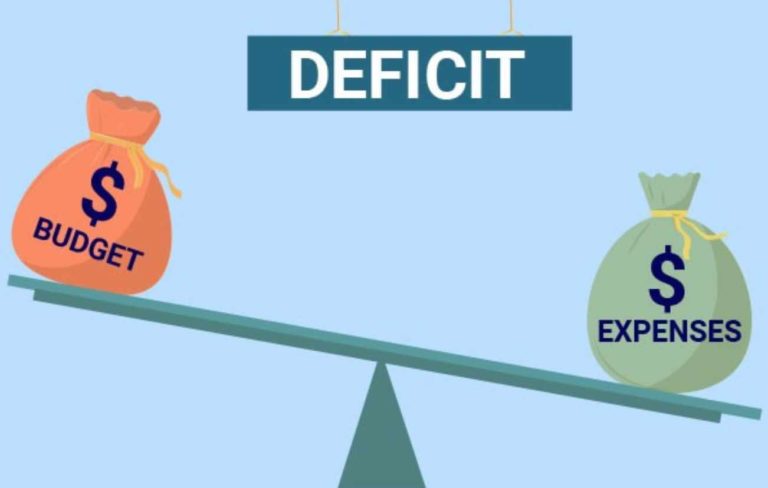Budget Deficit: Meaning, causes, effects & solution

You probably might have come across the term “Budget Deficit”, perhaps when reading an article on economics or watching the news. It’s not a strange concept as it is commonly used in areas of finance and marketing, in simple terms it means when expenses exceed income. It is a concept that is experienced periodically.
In this article, you’ll explore the details of a budget deficit, what it entails, and its causes and effects. With our comprehensive guide, you’ll get the whole idea in no time.
Meaning of a Budget Deficit
A budget deficit is a situation that occurs when expenditures are greater than income or revenue. The concept of Budget Deficit is commonly associated with the government, although individuals, businesses, and organizations also encounter budget deficits. Growing budget deficit annually, gradually contributes to the national debt of a country. By implication, an increase in budget deficit results in increased national debt.
How Budget Deficits Work
An excess in expenditure beyond available income is what brings about a budget deficit. This imbalance can be adjusted by reducing expenses and increasing revenue/income generation. Nations intending to do this must improve the rate of income generated.
At the other end of the Budget Deficit is Budget Surplus, and this happens when revenue is greater than expenditure and as a result, there is sufficient income that can be distributed as the needs arise. In a situation whereby income generated and expenditure are stable, that is, income is equivalent to expenditures, the budget is deemed balanced.
What are the causes of Budget Deficit?
Budget deficit can be caused by several situations, some of which may be due to incidents going out of control and also change in lifestyle. Some of the well-known causes of budget deficit include:
1. Job Loss
This situation usually results in a budget deficit as income is no longer generated and expenditure continues to increase.
Insufficiency in generated revenue due to unemployment is a major cause of budget deficit associated with individuals.
2. Medical Bills
Illness requiring expensive treatments can lead to spontaneous expenses which sometimes may involve a huge amount of income to supplement payments.
3. Debt
Managing debts that keep on piling up eventually results in a budget deficit. Money owed takes a certain percentage of generated income, consequentially causing expenditure to exceed income as debt payment reduces income. This is experienced in the early stages of credit card debt.
4. Recession
A period of reduced economic activity has a lasting effect on national finance. Reduction in tax payments equally reduces generated revenue, and this promotes budget deficit due to expenditure exceeding revenues.
5. Excessive Spending
When income or revenue generated is spent beyond the carrying capacity or budget, there is the resultant effect of insufficiency in available revenue. This leads to an increase in taxation and borrowing by the government, thus debt further increases causing a budget deficit.
What are the Effects of Budget Deficit?
Some of the effects of budget deficit are described below:
Rise in Debts
A major effect of a budget deficit is the increase in debt. In terms of government, when expenditure is more than generated revenue, payment must be made for the expenses incurred. If perhaps from the past year there was a surplus in the budget, then supplementing expenditures through debt may not be required.
Short-term Growth in Economy
As the budget deficit is being funded, there is money withdrawal from various economic sectors by the government, resulting in the economy stretching too thin. This promotes economic growth in the short-term as government creates demands to generate revenue. However, it may harm the economy in the long run. The expenditures of the present will have to be settled by the future taxpayer.
Increased interest rates and bond yields
As a result of an increased rate of borrowing, a higher interest rate is incurred as well. As more money is borrowed leading to a rise in debt, interest rates and bond yields increase since compensation is required for the return of payments.
Inflation
This is the final outcome of a budget deficit in a nation. In critical economic situations, the government may increase the supply of money to settle debts and interests. This results in inflation. Inflation from a budget deficit rarely occurs, except in developing economies.
How is Budget Deficit Calculated?
To calculate the budget deficit, there is a simple formula that can be applied. It is given as:
- Budget Deficit = Total Spending – Total Income/Revenue
The income/revenue stated here includes credit payments, monthly returns and allowances, and Government tax income, whereas the spending or expenditure covers feeding, medical care, bills, and taxes.
Managing Budget Deficit
This can also be seen as reducing the budget deficit as the aim is to balance expenditure with income. In managing budget deficits, some strategies must be applied.
1. Cut Down Spending
When expenditure no longer exceeds income, there is either a balance in the budget or a surplus in the budget. By reducing expenses, the income generated becomes sufficient to handle major expenditures. In terms of the government, expenses can be cut down by reducing the budget spent on social programs such as Medicaid and social security. If spending is not properly managed, it will result in insufficient revenue and economic damages.
2. Increasing Revenue
Revenue increment is a guaranteed way of managing a budget deficit. In most cases, expenses may not be easily reduced as various needs may arise, however, having returns that far exceeds expenditure is more of an advantage.
3. Growth increase
Economic growth is largely dependent on generated revenue, the more money is being made, the more the economy grows. So long as there is money in circulation, an increase in economic growth is certain. Government can also increase tax revenue as a result of more money being generated by the growing economy.
Conclusion
A budget deficit occurs when expenses are higher than revenue, and it can happen at the individual, company/industrial, and state/governmental levels. By ensuring that your expenditures do not exceed your total income, you can prevent a budget deficit from occurring, whether your income is low or high.
Budget deficits may sound and seem devastating, and strategizing to reduce them may sometimes be confusing, however, they can be managed with the right approach.





